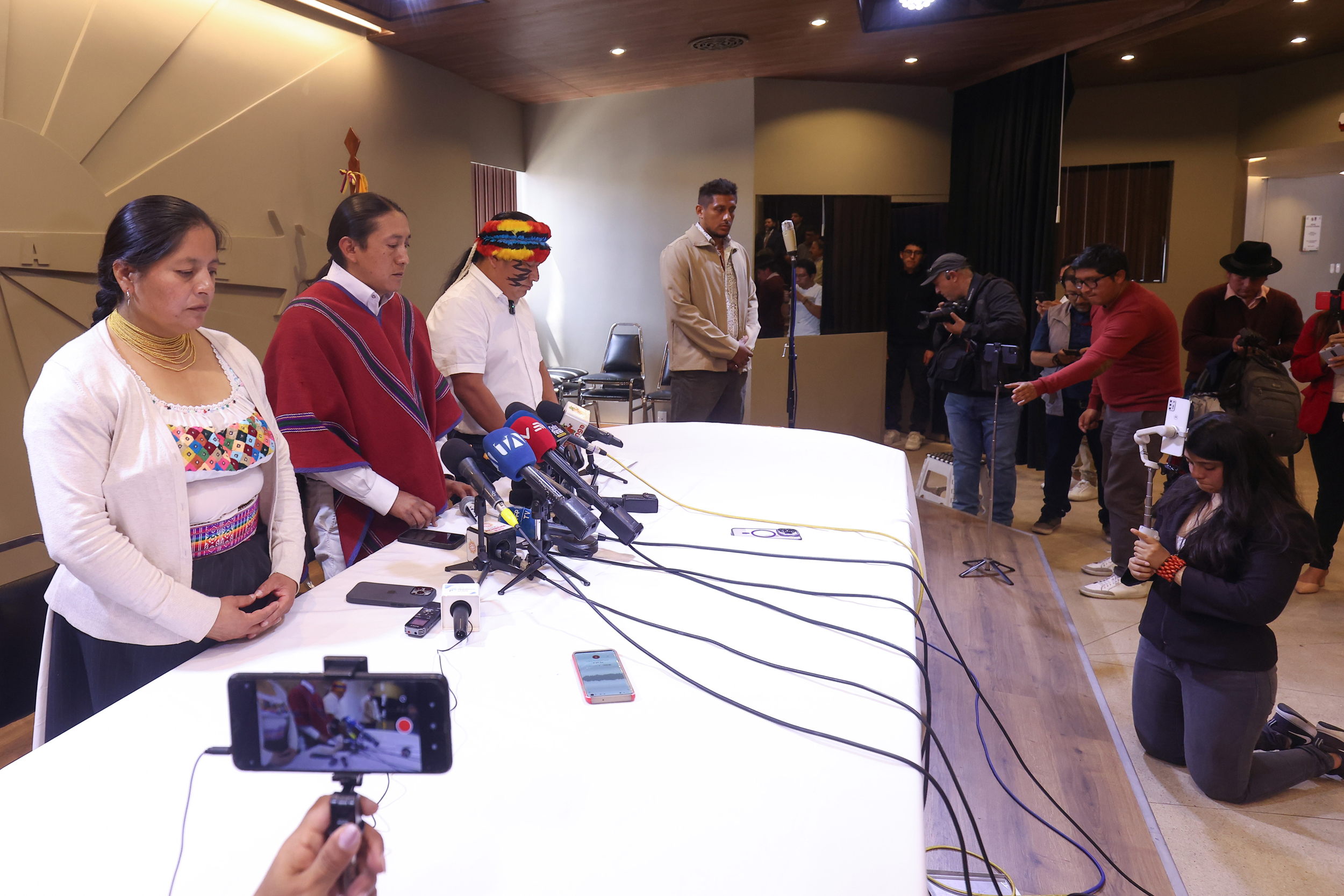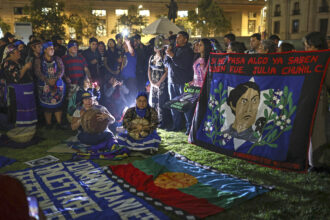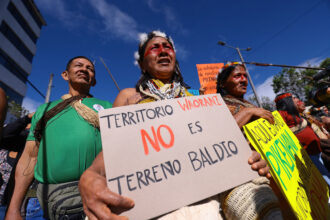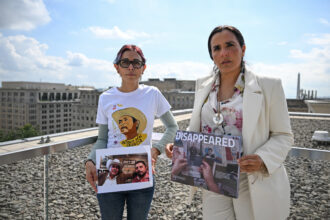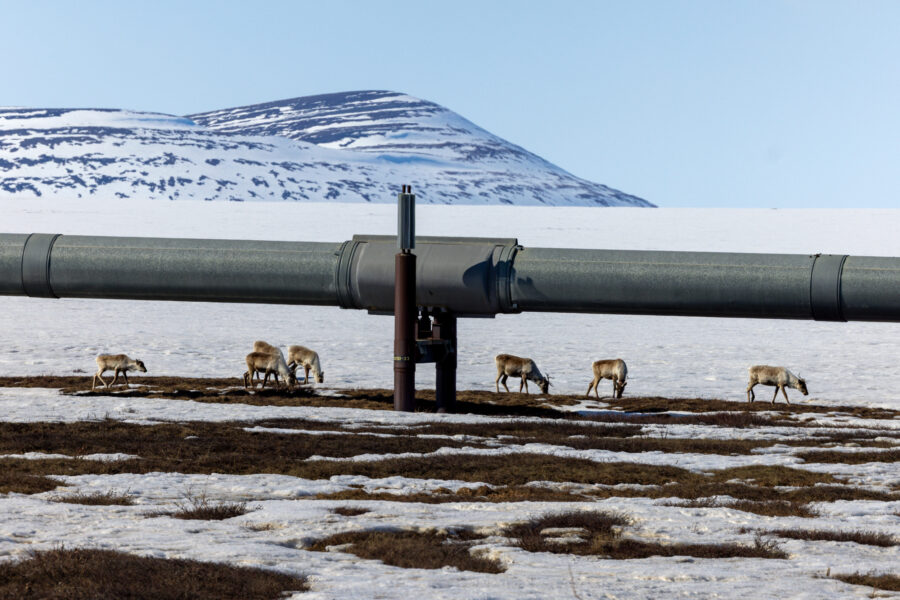An Indigenous land defender was shot and killed on Sunday in Cotacachi, Ecuador, where he was marching in protest of high costs of living and government crackdowns on Indigenous and environmental activists.
Efraín Fueres, 46, a community leader, was one of thousands of Ecuadorians who have taken to the streets over the past two weeks amid a wave of authoritarian moves by the government, including freezing activists’ bank accounts and suspending a media organization. The Indigenous Kichwa federation Chijallta FICI, which Fueres belonged to, released a statement condemning his killing and attributing blame to “military bullets.”
“Chijallta FICI denounces with deep pain and indignation the murder of our brother and respected community leader,” the statement said, calling the killing “the most painful proof that the Government has opted for war and blood instead of listening to the just demands of the people.”
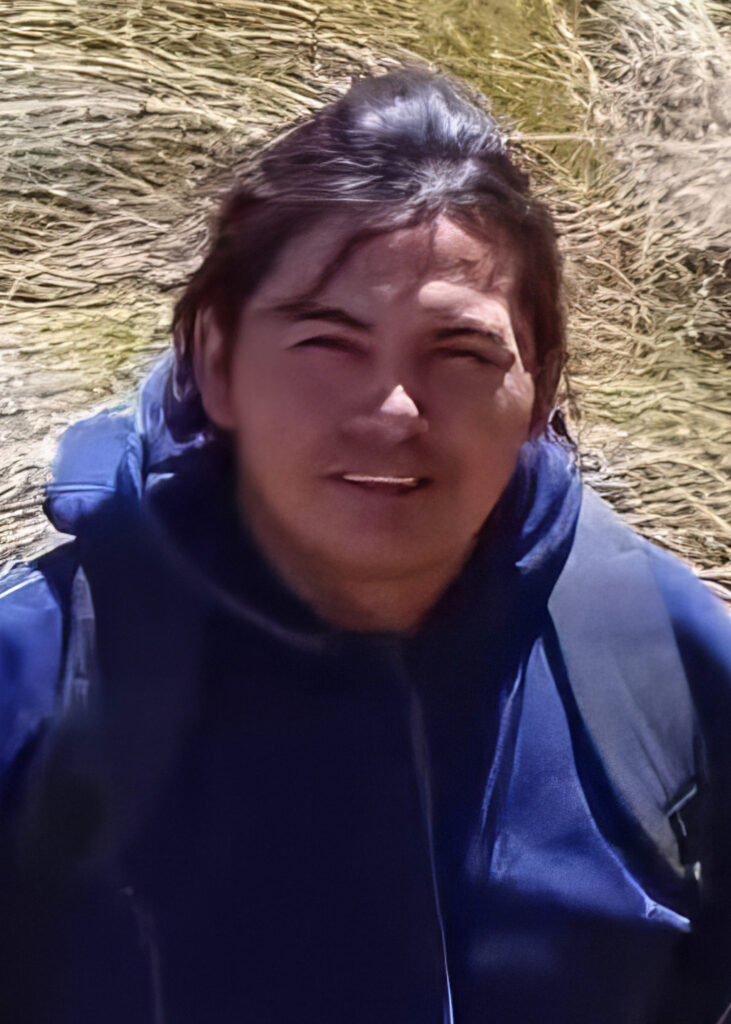
Videos posted to social media show Fueres marching around 6:30 a.m. when he is gunned down. A military vehicle then approaches Fueres, who was lying in the street with a companion kneeling over his body. Armed officers then surrounded the men and began repeatedly kicking the companion.
The Ecuadorian Consulate in Washington, D.C., did not respond to requests for comment. But the Ecuadorian public prosecutor’s office said in a social media post that it was launching an investigation.
Separately, the Ecuadorian army posted on Sunday that 12 soldiers were injured in Cotacachi while guarding a food-aid convoy.
The people marching in recent weeks, led by Indigenous groups, condemned a Sept. 12 government decree that removed fuel subsidies, raising gasoline prices by more than 50 percent. Advocates say the policy harms millions of poor Ecuadorians who live on less than $100 a month.
Ecuadorian President Daniel Noboa, an ally of U.S. President Donald Trump, instituted a state of emergency on Sept. 16 in provinces across the country, empowering the government to limit public travel, impose curfews and restrict other freedoms. He also moved to rewrite the Constitution, which currently includes strong protections for the environment and for Indigenous peoples.
Noboa has alleged, without presenting evidence, that transnational criminal organizations, including the Tren de Aragua, were financing the Indigenous-led protests.
The country’s largest Indigenous organization, Confederation of Indigenous Nationalities of Ecuador (CONAIE), denied that accusation and said the protests are driven by a broad set of demands: the repeal of the gasoline price increase, government compliance with a nationwide referendum to end oil production in a part of the Amazon rainforest and an end to the criminalization of Indigenous and environmental activists.
The organization is also calling for a halt to Ecuador’s extractive economic model, demanding the government revoke licenses for three mining projects across the country.
Sisa Inés Cotacachi, vice president of Chijallta FICI, said on Sunday that communities throughout Imbabura province where Fueres was killed were also protesting against a series of national government decrees that have rolled back environmental and human rights protections.
In August, the Ecuadorian government moved the Ministry of Environment, Water and Ecological Transition, transferring its responsibilities—including environmental licensing and enforcement—to the Ministry of Energy and Mines.
The government also passed a law in August to “promote transparency and accountability in non-profit social organizations,” though critics argue it is aimed at curtailing civil society’s ability to monitor rights violations and seek accountability at a time of expanding oil and mining extraction.
A coalition of Ecuadorian lawyers, scientists and human rights activists said they are releasing this week a call for organizations to sign onto an open letter to United Nations human rights experts condemning the two laws and accusing the government of “Deploying military forces around extractive sites and criminalizing environmental protest.”
Inés Cotacachi said Fueres was shot three times.
“We condemn this brutal attack on organized resistance,” she said. “If the government represses the people, they will only be forced to rise up to demand their rights.”
Frozen Bank Accounts
The death of Fueres, a father of two, comes after the government has targeted dozens of prominent environmental defenders and Indigenous leaders and organizations in recent weeks. The Noboa administration has arrested or detained some, and frozen the bank accounts of others, while reporting them to the federal prosecutor for the alleged crime of “unjustified private enrichment.”
Among those impacted are leaders of a large anti-mining movement in the Andean city of Cuenca. On Sept. 16, around 100,000 people poured into the streets there to demand an end to a Canadian mine, chanting: “Water is worth more than anything!”
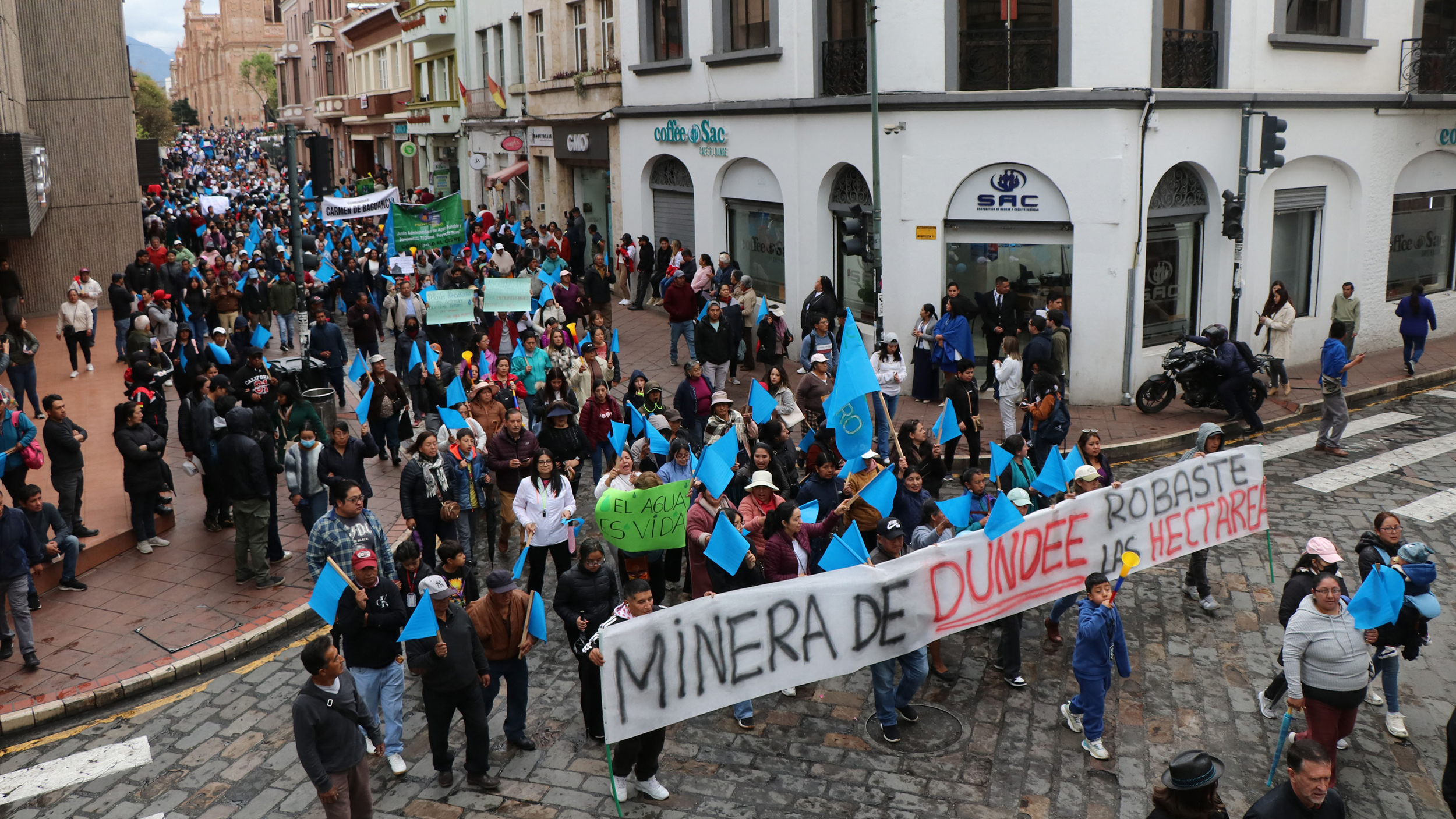
David Fajardo, a lawyer who helped organize that resistance, learned last week when he tried to withdraw funds that his bank accounts had been frozen. He said he received no warning, no explanation and no information on how to resolve it.
“It is an absolute abuse of power,” said Fajardo, who had a few thousand dollars in savings in his accounts.
Others impacted by the freezes or investigations into their finances include leaders of CONAIE, the president of the Confederation of Indigenous Nationalities of the Ecuadorian Amazon, the president of the National Anti-Mining Front, a representative of the Amazon Sacred Headwaters Alliance and the president of the Indigenous-rights nonprofit Fundación Pachamama.
Experts tracking attacks on environmental defenders—people who peacefully act to protect nature—say governments are increasingly using such tactics to discredit defenders and hamper their ability to work. Non-physical attacks often precede physical assaults, according to researchers.
Last year, an average of three environmental defenders were killed a week, many of whom had opposed mining projects. In Ecuador, nearly 9,000 square miles of mining concessions overlap with protected areas and Indigenous territories.
“We categorically condemn the systematic criminalization exercised against those who defend life, territory, and the rights of Nature in Ecuador,” said a written statement from the Ecuadorian Coordinator of Organizations for the Defense of Nature and the Environment, a coalition of more than 80 Ecuadorian environmental organizations.
The statement also said government claims that the president of Fundación Pachamama, Belén Páez, has unjustly enriched herself lack a “factual or legal basis” and are a “deliberate strategy” to intimidate and retaliate against legitimate environmental defense work. Páez also released a statement denying the government’s allegations.
“This is the most serious persecution against environmental and Indigenous leaders in Ecuador’s democratic history. It is no coincidence that they are all critical voices of the extractive model and defenders of the rights of nature and peoples,” the coalition’s statement said.
Fajardo said it’s not clear what legal authority the government is using to freeze bank accounts, but he believes officials may be using the law enacted in late August, which aims to target donations to nonprofits.
“The real intent of the law is not to control illicit capital,” Fajardo said, “but to control social organizations, especially those involved in defending human rights, nature and territories against extractivism.”
A Push to Change the Constitution
Since commercial quantities of oil were discovered in Ecuador’s Amazon rainforest in the mid-20th century, the country’s economy has been dominated by oil exports, much of that to the U.S. state of California.
In 2021, the government took steps to double oil production and streamline permitting for mining.
Even so, Ecuador’s strong Indigenous and environmental movements have drawn on their formidable constitutional rights to win hard-fought victories impeding those plans.
In 2019, for instance, Indigenous Waorani communities defeated government plans to auction off oil rights on their lands, citing a violation of their right to free, prior and informed consultation.
In 2023, voters chose to end oil production in one of the most ecologically diverse places on Earth, doing so via a nationwide referendum made possible by a constitutional right to citizen initiatives. The government, however, has repeatedly delayed implementation, a move condemned by human rights experts.
And in March, Indigenous groups and activists won a landmark ruling from a regional human rights court against the Ecuadorian government involving the rights of uncontacted Indigenous peoples, who have been under growing pressure from an expanding oil industry despite explicit constitutional protections.
This story is funded by readers like you.
Our nonprofit newsroom provides award-winning climate coverage free of charge and advertising. We rely on donations from readers like you to keep going. Please donate now to support our work.
Donate NowEcuador’s 2008 Constitution is also the first and only in the world to recognize that nature has intrinsic rights. Lawyers like Fajardo, Indigenous communities and activists have won dozens of cases vindicating ecosystems’ rights to exist and maintain their natural cycles.
All of that is now under threat.
Earlier this month, an electoral council approved Noboa’s request to hold a referendum asking voters’ permission to rewrite the constitution. That vote will take place on Nov. 16.
Noboa has said a new constitution would give the government the tools it needs to fight drug trafficking cartels that have flooded into the country in recent years.
Environmental and human rights defenders describe the move as an excuse to roll back due process and civil liberties, centralize power and clear the way for mining and oil companies.
Some also see it as an echo of U.S. President Donald Trump’s policies to gut environmental protections and crack down on left-leaning groups, which his administration says are also being done for national security reasons. In April, Noboa said Ecuador would welcome U.S. military assistance to combat transnational drug trafficking groups, including the possibility of installing permanent U.S. military bases in the country.
Alberto Acosta, an Ecuadorian economist and former head of the Ministry of Energy and Mines, said in a written statement that Noboa’s government stands at a “crossroads,” with rising unemployment and poverty, falling popularity and “more than justified popular protests, to which he is responding with unprecedented violence.”
“Now, unable to fully control the Constitutional Court,” Acosta added, “he is opting to fire what appears, for now, to be his last shot: the Constituent Assembly.” That’s the body that will update the constitution if voters agree, and it’s “a shot that could very well backfire,” he wrote.
A Widening Crackdown
Successive Ecuadorian governments have tried to silence Indigenous and environmental activists, but that has escalated since Noboa took office in November 2023.
In 2024, prosecutors filed terrorism charges against more than 70 environmental and human rights defenders in Palo Quemado, home to eight Indigenous communities, following protests against another Canadian mining project. The government deployed hundreds of police and military personnel, leading to clashes where officers fired rubber bullets and released tear gas, leaving at least 15 community members injured, according to a statement released by a coalition of human rights and environmental organizations.
In the Las Naves region that year, the government sentenced six human rights defenders to prison and ordered them to pay hundreds of dollars in fines to yet another Canadian mining company for allegedly conspiring to damage company property, charges the defenders denied. Human rights groups have criticized the prosecutions, alleging that the government excluded key evidence and blocked independent observers from monitoring the trial.
Tensions have mounted in recent weeks.
On Sept. 22, security forces shot rubber bullets and tear-gassed peaceful Indigenous demonstrations in Imbabura province, where Fueres was killed Sunday, according to a statement from the United Nations Permanent Forum on Indigenous Issues.
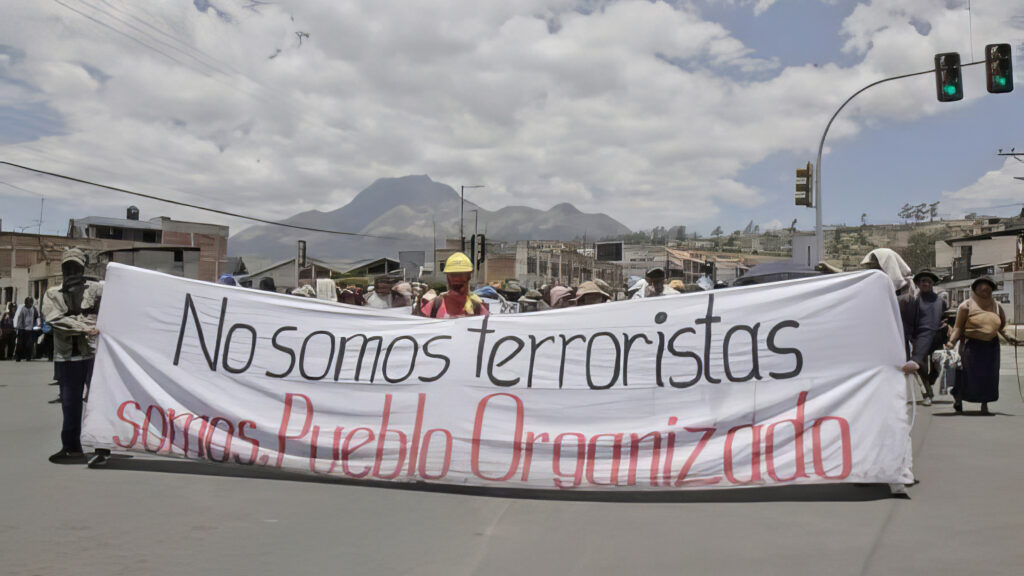
At least 13 Indigenous protesters, members of the Kichwa Otavalo people, were detained and charged with terrorism-related offenses that Indigenous organizations have called “arbitrary,” said the U.N. statement.
The detainees were transferred to one of Ecuador’s high-security prisons known for jailing violent members of transnational criminal groups. The Chijallta FICI federation said other people resisting government crackdowns have been injured and need medical assistance.
The government has also targeted journalists.
On Wednesday, the Noboa administration suspended the operations of an Indigenous and community media organization known as TV MICC, citing national security concerns.
On Sunday, the Ecuadorian human rights group Inredh and CONAIE said locals in Imbabura province, where Fueres was killed, reported that their internet and phone connections had been cut off.
Astrid Puentes Riaño, the United Nations special rapporteur on human rights and the environment, called the attacks “worrisome” and said governments “have the obligation to guarantee a safe environment for defenders and guarantee their human rights.”
She and other human rights experts said they are reviewing the situation.
Meanwhile, Fajardo said he fears Ecuador is on the cusp of an era of violent repression against Indigenous, social and environmental defenders.
“Despite how worrying this situation is,” he said, “we will not give in to pressure from the government.”
Journalist Marcos Colón of Amazônia Latitude contributed reporting to this story.
About This Story
Perhaps you noticed: This story, like all the news we publish, is free to read. That’s because Inside Climate News is a 501c3 nonprofit organization. We do not charge a subscription fee, lock our news behind a paywall, or clutter our website with ads. We make our news on climate and the environment freely available to you and anyone who wants it.
That’s not all. We also share our news for free with scores of other media organizations around the country. Many of them can’t afford to do environmental journalism of their own. We’ve built bureaus from coast to coast to report local stories, collaborate with local newsrooms and co-publish articles so that this vital work is shared as widely as possible.
Two of us launched ICN in 2007. Six years later we earned a Pulitzer Prize for National Reporting, and now we run the oldest and largest dedicated climate newsroom in the nation. We tell the story in all its complexity. We hold polluters accountable. We expose environmental injustice. We debunk misinformation. We scrutinize solutions and inspire action.
Donations from readers like you fund every aspect of what we do. If you don’t already, will you support our ongoing work, our reporting on the biggest crisis facing our planet, and help us reach even more readers in more places?
Please take a moment to make a tax-deductible donation. Every one of them makes a difference.
Thank you,


